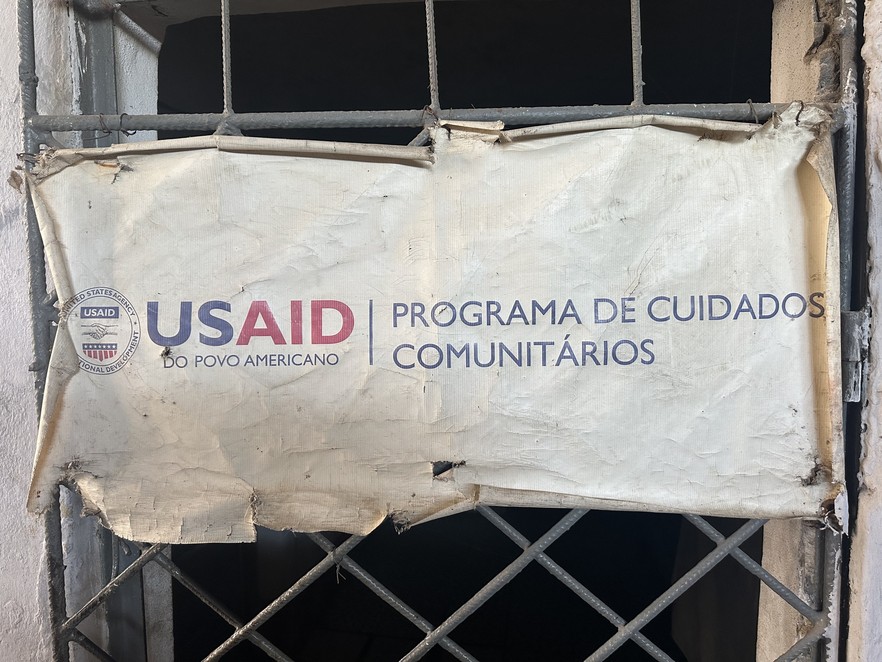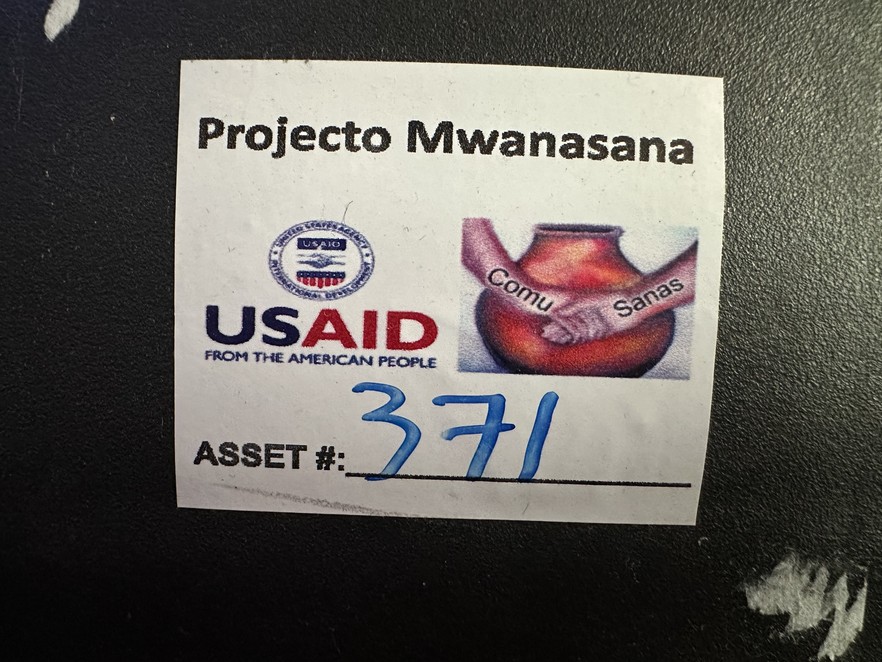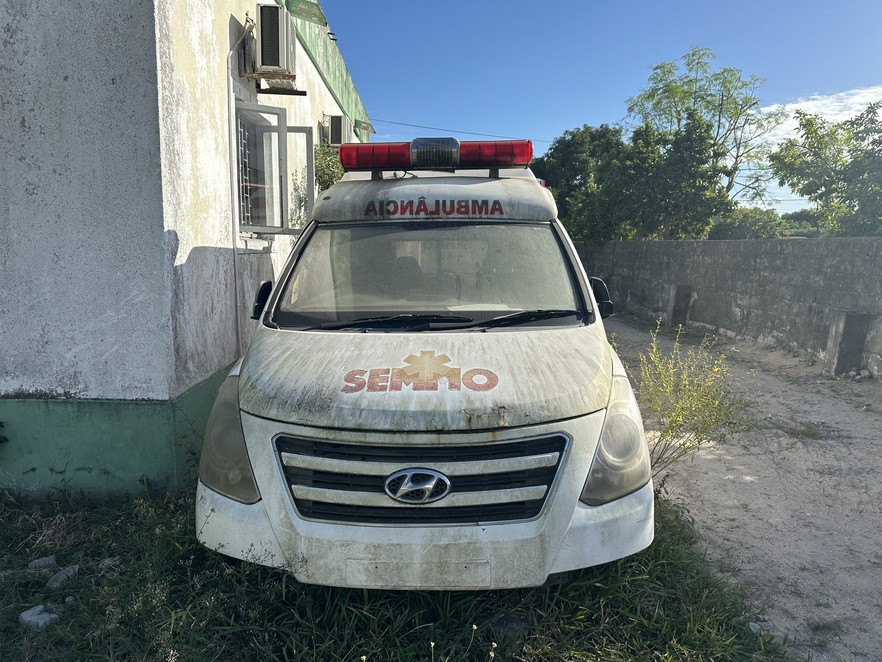After US funding cuts, Mozambican children died: Who bears responsibility?
Both the US and Mozambican governments have failed
Sign outside the offices of an organisation in Mozambique that got defunded by USAID. Photos: Jesse Copelyn
Last month, Spotlight and GroundUp published a two-part exposé showing how US aid cuts led to the deaths of children in Mozambique. Here, Jesse Copelyn considers what led to this tragedy and who should bear responsibility for it.
After the US Agency for International Development (USAID) abruptly terminated billions of dollars’ worth of overseas aid grants, the health system in central Mozambique was left in tatters. Earlier this year, I travelled to two badly hit provinces of the country to describe the toll.
In one article, I reported how thousands of orphaned and vulnerable children in Sofala province had been abandoned by their USAID-funded case workers. Many of these children are HIV-positive and had relied on case workers to bring them their medicines or accompany them to hospitals. Without them, some children stopped taking their treatment and died.
In a second piece, I reported how USAID had cut funding for contractors transporting medicines and diagnostic tests to health facilities in Manica province. This led to shortages of HIV drugs at hospitals in the area, which also led to the deaths of children.
In the midst of all this chaos, I was often curious to know from people on the ground who they held accountable for this situation and who they believed needed to solve the problem. My assumption was that they would call for the Mozambican government to help them out.
I was surprised to find that in the affected villages which I visited, this was far from anyone’s expectation. In fact, for most it was simply unthinkable that their government could do anything to save them.
“You mentioned the government,” one community leader said after I asked whether the state should intervene. “But even these chairs we’re sitting on are stamped with USAID logos. So what help can we expect from the government?”
Sign on the back of a chair in an organisation in Mozambique.
Indeed, the more I learned about governance in Mozambique, the more understandable this attitude became. Throughout the country, core government functions have been outsourced to a combination of foreign governments, aid agencies, interstate bodies, and private companies.
For instance, many of the country’s essential medicines are procured by a large international financing body called the Global Fund to Fight AIDS, Tuberculosis and Malaria. Up until January, the transportation of these medicines to hospitals was overwhelmingly financed by US aid agencies, as were the pay cheques of many health workers.
Outside of the healthcare sector, the story is similar.
The main highway that I travelled along to reach different villages was built and paid for by Chinese corporations and banks. To keep hydrated I relied on bottled water supplied by private companies since the taps either didn’t run or produced contaminated water.
In many of the impoverished rural settlements that I visited, there was virtually no state infrastructure, and people received no financial support from the government. Instead, they primarily depended on aid organisations.
The country’s national budget has historically been heavily supplemented by foreign bodies, including the International Monetary Fund (IMF) and European Union. (Though much of this support was suspended in 2016/2017.)
Even national defence has been partially outsourced.
When Islamist militants began rampaging through the northern province of Cabo Delgado, the government struggled to contain it and contracted Russian and South African mercenary groups. When that failed, they authorised a military intervention by the Southern African Development Community (SADC) and invited a parallel mission by the Rwanda Defence Forces.
It is thus no surprise that Mozambicans have virtually no expectation that their own government will come to the rescue when facing an emergency. Instead, they look outward. As one community leader in a rural village told me, “Here, we depend on Trump.”
Cash-strapped and corrupt
Mozambique has 35-million people. About 2.5-million live with HIV, the second highest HIV-positive population in the world after South Africa. Life expectancy is well under 60. The country is extremely poor: eight in ten people live on less than three dollars per day.
The government is also deeply cash-strapped. The South African government spends ten times more per citizen than the Mozambican government does. A large chunk of its spending goes towards paying off debt.
At present, Mozambique simply doesn’t have the money to build an effective health system, though had it spent its limited budget reserves more effectively over the years it could have developed a health system that was at least a bit more independent of donor support.
Instead, the country’s budgetary resources have often been wasted on corruption. Mozambique currently ranks 146th out of 180 in the world on Transparency International’s Corruption Perceptions Index. This has directly played a role in its public health woes.
One clear example of this is the Tuna Bonds scandal, in which state-owned companies took out two billion dollars’ worth of loans, backed by secret state guarantees. This was supposedly to finance large fishing and maritime security projects. In reality, much of the money was siphoned off to enrich political elites, including the then-finance minister (who is now in prison).
As a result of those decisions, the country was swallowed by debt. And when the extent of the corruption was publicised in 2016, the IMF pulled its financial support for Mozambique.
A detailed 2021 report found this directly led to a fall in economic growth and government spending. It states: “Comparing the three-year average of 2016-18 to the three previous years, spending on health and education fell by USD 1.7 billion – entirely due to the debt.”
The country’s governance crisis is further demonstrated by the political unrest that engulfed the country after the October elections last year, triggered by accusations of election fraud. The accusations were likely overblown, but international observers said the election was not free and fair.
An ambulance parked in the grass in the Dondo district of Sofala Province.
Even during the brief one-week period that I spent in central Mozambique, signs of corruption and mismanagement filtered into my interactions with officials.
For instance, before I embarked on a multi-day tour of one province, government officials told me that someone from the provincial health department would need to accompany me on my trip. This was apparently in order to make formal introductions to district-level officials that I hadn’t asked to meet. For this apparently vital service, the man would need to be paid a per diem of roughly 500 rand a day for two days, they said.
The civil servant in question was a very senior person in the provincial health department. Despite facing a collapsing health system in the wake of the US cuts, he was apparently ready to drop everything he had going for the rest of that week to follow me around.
When I explained that I wouldn’t pay a government official to stalk me, I was told that saying no wasn’t an option. This is unfortunately the way things are done around these parts, said a local who helped arrange the tour. (Neither GroundUp, Spotlight nor I paid the bribe, incidentally.)
US responsibility
Against this backdrop, it is perhaps no surprise that defenders of the current US government have often resorted to arguments about moral responsibility when justifying the decision to abruptly slash aid. It is reasonable to ask why the American taxpayer should bear any of the brunt of Mozambique’s public health system when so many of its problems have been caused by the Mozambican government itself.
But it’s not so simple.
The Mozambican civil war from 1977 to 1992 destroyed the country. The anti-communist RENAMO insurgency likely received millions of dollars of support from US evangelists, despite committing numerous atrocities. It is strongly suspected that the US government also materially supported RENAMO. So the US’s involvement in Mozambique has not been innocent. It could be argued that its aid spending was the least the US could do to make amends for its role in the war.
Moreover, Mozambique didn’t develop its high level of dependency in isolation. For over two decades, the US actively took responsibility for core functions of the country’s health system. Up until January, the US government continued to sign numerous contracts with local organisations, pledging millions of dollars to help run life-saving health programmes for years into the future.
The health system was consequently built around these commitments.
If the US was going to take that much responsibility for the wellbeing of some of the world’s most vulnerable people, then it had a duty to at least provide notice before pulling the plug. Instead, it chose to slash the funds instantly, and in a manner that needlessly maximised damage and confusion.
Stop-work orders were issued overnight which required that people who were doing life-saving work down their tools immediately. Organisations decided to adhere to these instructions rigidly in the hope that their funding would be reinstated. At that point the Trump administration said it was only pausing aid funding pending a review, and no one wanted to give the reviewers a reason to terminate their programmes.
The consequence was complete chaos.
Orphaned children in extremely rural parts of Mozambique waited for their case workers to bring them their medicines, but often they simply never came. Many of these children had no idea why they had been abandoned.
When certain case workers decided to defy the stop-work order and continue their work voluntarily, they were forced to do so in secret.
To add fuel to the fire, the Trump administration routinely provided contradictory information to its former recipients and to the public.
The initial executive order signed in January said all foreign development assistance would be suspended for 90 days, pending a review, and might be restored after this time.
Then, Secretary of State Marco Rubio issued a waiver which stated that the suspension wouldn’t apply to life-saving humanitarian services. Rubio told the public that organisations providing these life-saving services could instantly resume their work under this order.
Yet the organisations themselves received different instructions from their USAID officers. Rather than immediately continuing their work, they were told to submit revised budgets that only covered life-saving services and to wait for approval.
Organisations rushed to submit these budgets by the deadline. But in the end, the green light never came and their funds remained frozen. This was not only the case in Mozambique; researchers estimated that virtually no funds were released under Rubio’s waiver globally.
In the meantime, Rubio stated that organisations that hadn’t resumed life-saving activities were clearly unable to understand instructions or were simply trying to make a political point.
Later on, the organisations received explicit termination notices, ending their programmes.
Despite this, US embassies and several large media outlets continued to reference Rubio’s order as if it was actually implemented en masse. Even as I write this, the on-again, off-again US aid story is unfinished.
This mixed messaging created an enormous amount of confusion for staff of these organisations and the recipients of their work, ultimately for no clear benefit to the American people.
There was simply never any reason to act this callously toward health organisations to whom USAID had pledged its support. In contrast to the rampant corruption which has plagued the Mozambican government, these organisations were heavily audited in order to continue receiving funding.
The work they were doing was clearly making a material difference to some of the poorest people on earth. In the far-flung settlements that I visited, villagers told me about how their lives had been transformed by these organisations. Many were only put on life-saving HIV treatment because of them.
Whatever arguments one may want to advance about the importance of self-sufficiency and national responsibility, none of this justifies the US government administering the aid cuts in such a callous and confusing manner.
Support independent journalism
Donate using Payfast

Don't miss out on the latest news
We respect your privacy, and promise we won't spam you.
Next: Pensioners on the move for Mandela Day
Previous: Debate: Will the Employment Equity Act transform companies or slow growth?
© 2025 GroundUp. This article is licensed under a Creative Commons Attribution-NoDerivatives 4.0 International License.
You may republish this article, so long as you credit the authors and GroundUp, and do not change the text. Please include a link back to the original article.
We put an invisible pixel in the article so that we can count traffic to republishers. All analytics tools are solely on our servers. We do not give our logs to any third party. Logs are deleted after two weeks. We do not use any IP address identifying information except to count regional traffic. We are solely interested in counting hits, not tracking users. If you republish, please do not delete the invisible pixel.



